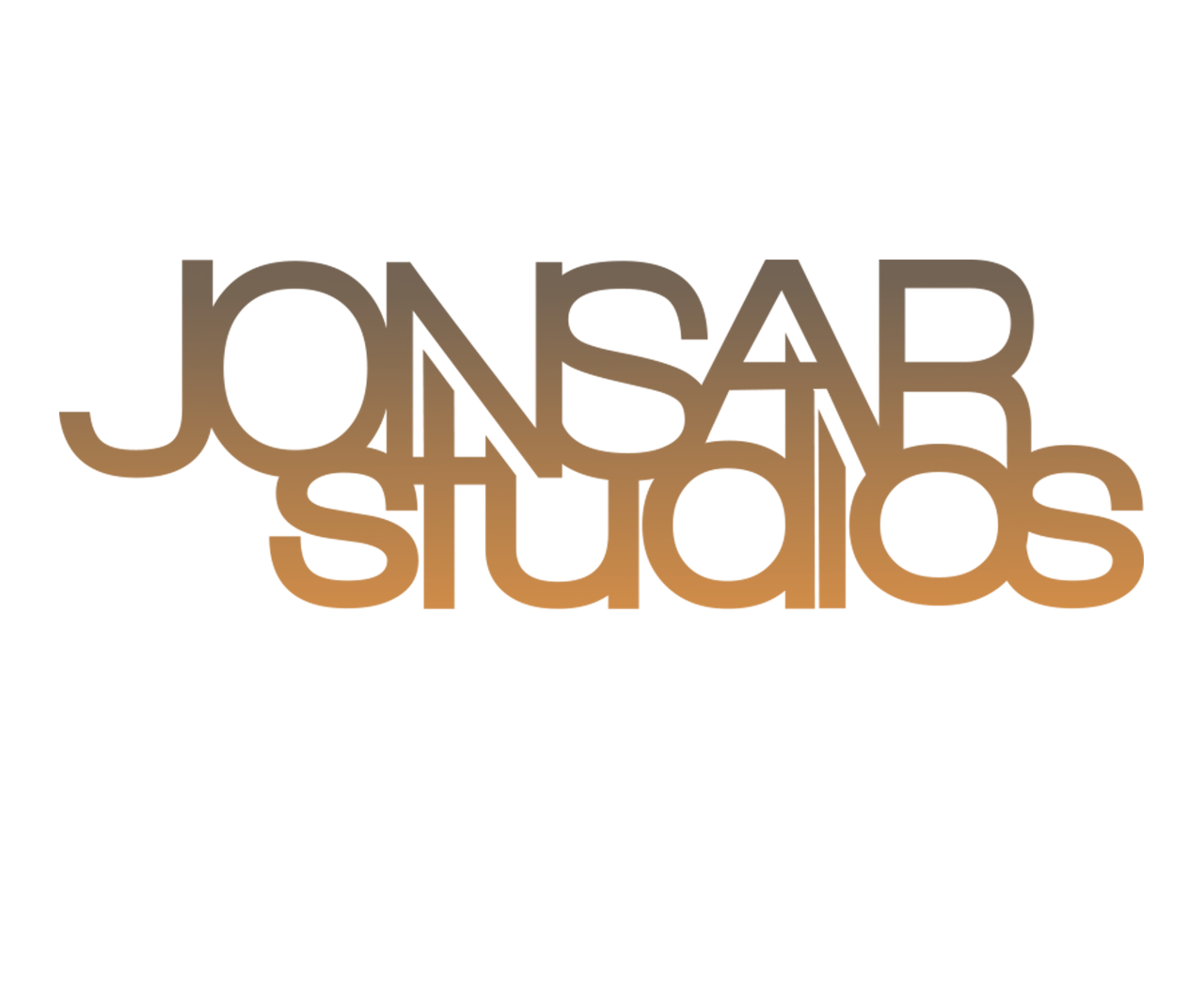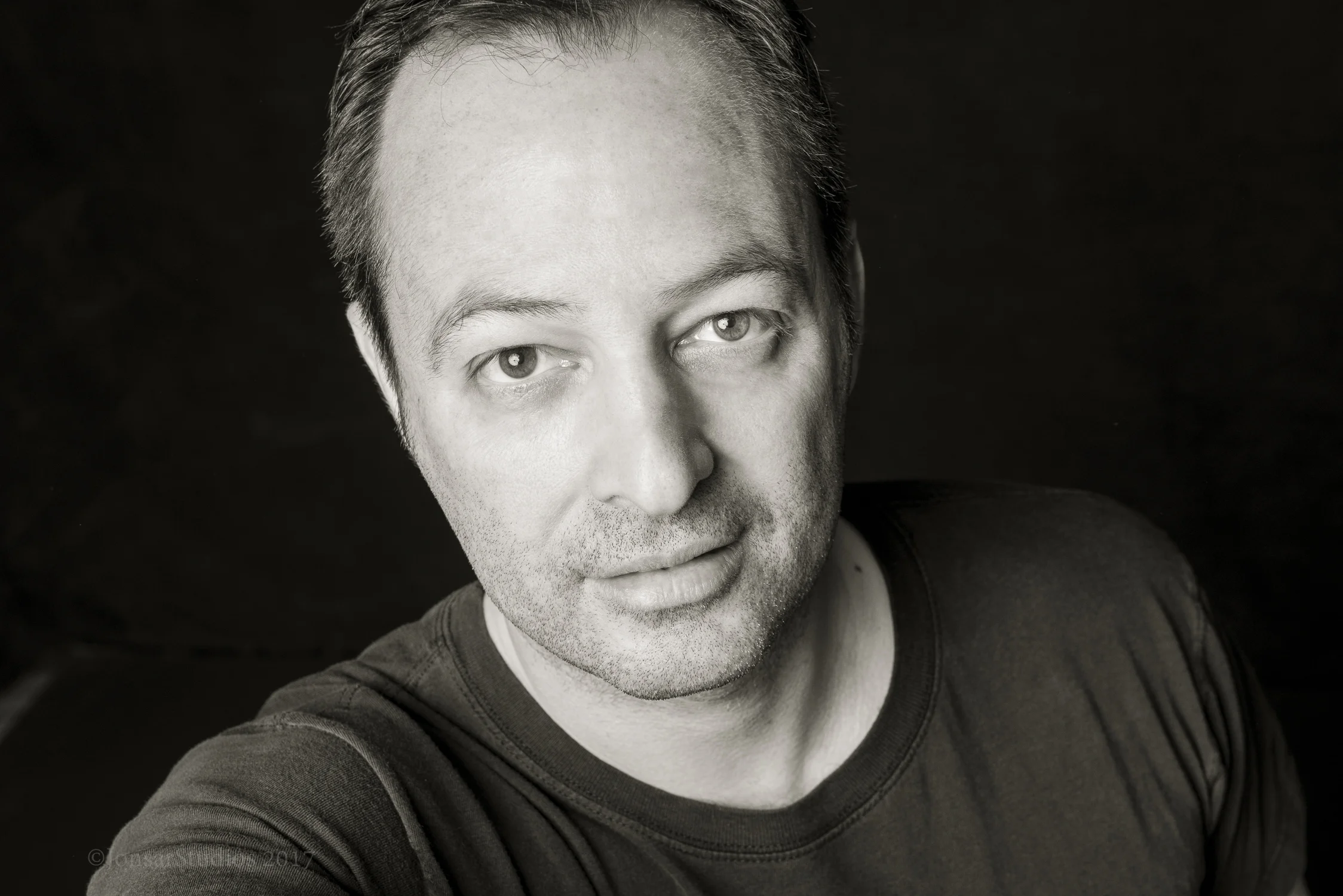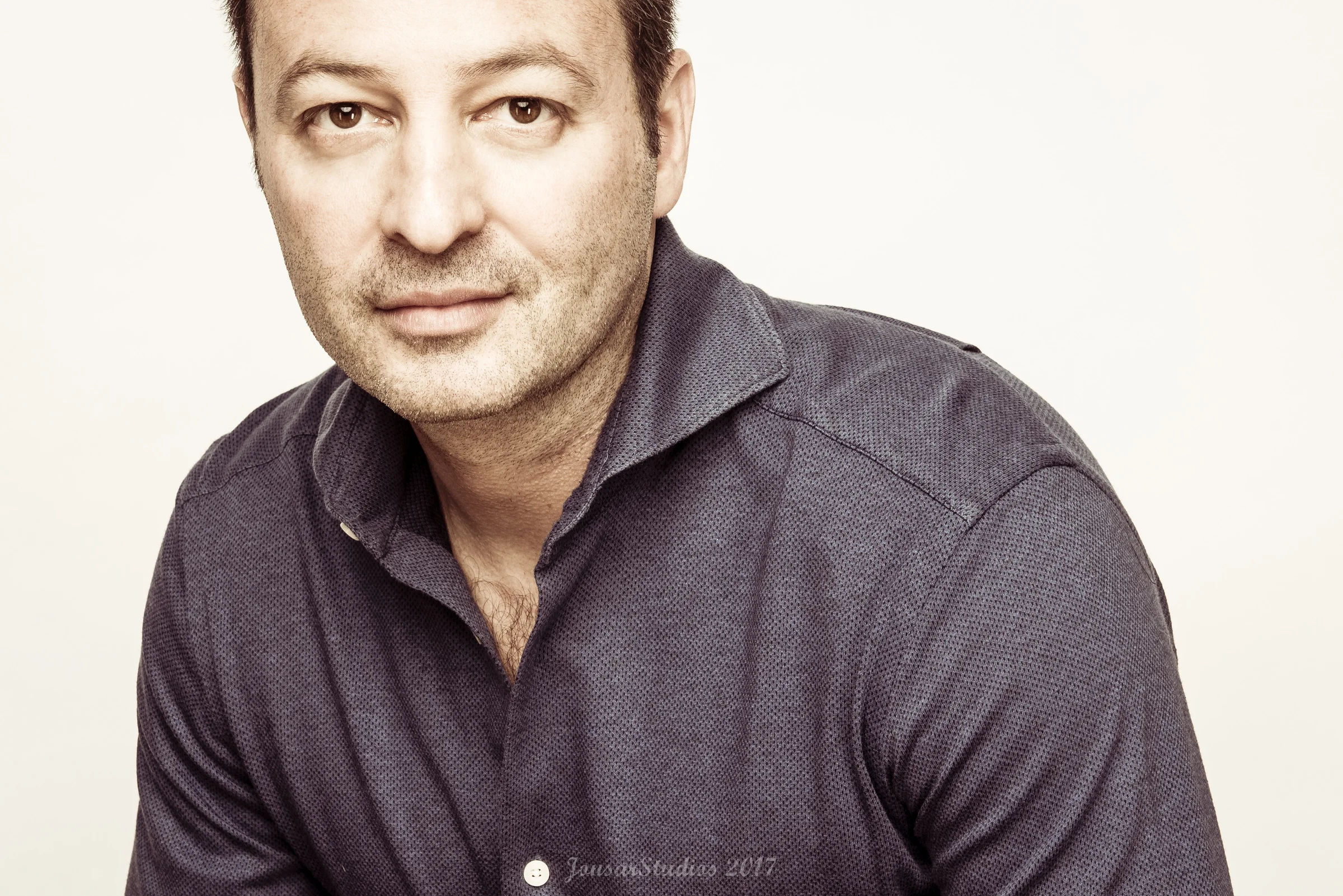Rick Snyder - Conversations with Artists
What is the art of what you do?
It's the creative process of writing - and the art is not knowing what it is as I'm writing it. It's truly letting the writing take it's own shape. I always think I know the storyline, that I know where it's going and then something happens and it evolves and I surrender to the process. That is the art.
What does it feel like to "surrender to the process" of something you're creating?
It's exciting because it's a co-creation. I let myself get taken for the ride in that direction and I like the fact that I don't know where it's going. There's something alive and creative about that.
If it's a co-creation, who is the cowriter?
I believe that we all have a deeper muse inside of us; a deeper resource. When we get out of our normal mind frame and consciousness and relax we literally come from a different reference point. It's then that this other stream of data comes through, this other author, this co-author comes through. To me the co-author is a deeper part of ourselves that we don't access on a day-to-day basis necessarily, unless we're receptive to that. My sense is that we have our normal every day thinking in the way that we see the world, but there are moments when that pauses or relaxes and allows for a deeper intelligence to come through.
So is that deeper intelligence is a part of yourself?
I wouldn't dare claim to know fully. That's what's beautiful about creativity - it's a mystery. That's the question: At what point does my deeper wisdom intersect with the unknown in almost way of the Michelangelo painting of God and Man touching fingers. I definitely think there's a deeper resource that we each can access, but what percentage of that is my pure higher self, as some people call it, and what percentage is that some other inspirational force? I don't now that answer, but there is some magic that happens - I know that.
When you say surrender to the process, what is the process?
I think when you're in an artistic process there is a momentum, a movement of some sort, but the exciting part is when it takes a life of it's own, when you don't get in the way of the process. So the process to me is where I have a sense of an outline or a direction or a through line - when I can actually taste the through line of my writing. The exciting part is when that gets co-mingled with the mystery. So I think there is a through line that I start to intuit, and then it's really trusting it, trusting the through line.
Who is your favorite poet?
One of my favorite poets is David White - he's an Irish Poet. I feel blessed that I'm getting to go on a week long trip with him in Ireland this summer. We'll be going on a tour of Claire County - the heart of the Irish tradition of the Bard, and the soulful poet and Celtic music. It's going to be a soulful journey, and I intuit that it's going to be an inspiring week for me and my writing. He is such a soulful, deep, deep guy and getting to share that with him while he is still alive is pretty special.
Are there any of his words you can share with us?
He's a philosopher-poet and a poet-philosopher. One of my favorite things he says is this: "Are you having the conversation that you were designed for? Are you having the conversation that you were made for in your life right now? Are you having that conversation? How do you know if you're having that conversation in your life? And what are the courageous conversations? They're usually the ones you're the most afraid to have. So take a moment to think about what those conversations are and with whom in your life you're having them. Where are you still holding back, and where are those opportunities to take that risk and have that courageous conversation? When you're doing that, you're at the edge of your life. You're living at the frontier of your life and then you're having the conversation that you're made for, that you were specifically designed for." So that's a little taste of David White, where he comes from when he speaks and writes. He's one of the few poets that when he reads his own poetry, it comes alive on a whole other dimension than when you just read it. Not every poet can do that; there are certain special poets that know how to bring their poetry alive in the alliteration of it -- and not just the written word. He has that presence about him that comes through when he reads his own poetry.
Have you been having those courageous conversations in your own life?
I have definitely taken some huge risks in my life. And I feel like it's an ongoing process, to come more and more into the conversation that I was made for. I feel that there are moments when I climb that mountain and live there, but then I"m aware there's a whole other mountain to climb that I hadn't seen before. As soon as I see and feel that, I want to go there. Then I kind of settle and arrive there. And then I feel like there's another mountain. Right now, where I'm at in my life is; I'm hungry for the next level of depth and the next level of adventure and discovery again, so I'm feeling that aliveness.
Talk about the vertical line, what is it?
There are many phrases and names out there for your intuitional center, for your life direction or your inner compass. People talk about their inner guidance or their inner compass, their inner GPS, inner navigational system -- there are a lot of books and philosophies out there with these different names. Since high school I've had this phrase that came to me called "the vertical line." I see it as a vertical line because it literally goes up and down my heart center and it's my intuitional guidance system -- it's connected to my soul path or my life's direction. It's specifically connected to the next steps I need to take on my journey. It doesn't come up around mundane types of choices, like 'oh, do I want Cheerios or French Toast.' It's really about deeper soul growth conversations, and the coolest thing about my vertical line, I don't really find it, it finds me. That's one of the distinctions vs. using my mind or will as we typically do. That's what excited me also; it's not about ego, like I'm trying to will my way or shape my life. It finds me when I'm not looking for it. It's kind of like when they talk about people falling in love; just when they stop looking for it, all of a sudden love shows up. Because they're not doing that seeking and grasping any more. That's how it works for me with the vertical line. I can cultivate a receptivity to it in a receptive space, but if I'm looking for it or looking for an answer, it doesn't knock on my door. There's too much "me" in the way. That's what I mean by surrendering; there has to be a surrender to a different kind of intelligence that's not coming from my smaller self - or whatever you want to call it - my ego. That's the humbling part of it all. It takes me for a ride, but I've learned to trust it over time. In the past I was led to Nepal, I've been led to the graduate school that I went to in Colorado - it was specifically that school. So that's what I mean, this 'thing' guides me towards my next significant steps. It could be people, it could be a place, it could be teachers... it helps round out the next thing I'm working on in myself.
It sounds like a spiritual antenna.
Exactly - it's a spiritual antenna, and that's also why I say "vertical line" because it's between me and me. You have yours between you and you, and that's what I love about it. It's your own natural uprightness that people can't manipulate. They can try, but the point is you can't syphon off of it. It's a vertical line, not a horizontal line. It's not between you and someone else. It's about you and you. That's why I like the term 'vertical line' because somehow it's that relationship with myself as a human being standing upright.
Do you think everybody has this spiritual antenna within them?
I do think everyone has it, but I think there are a couple of challenges to locating it. I feel very passionate in helping people locate this in themselves, and that's what my book is about. I think one of the challenges is that a lot of people are not conditioned, they're not ever shown or encouraged to discover this. It's not taught in school, they don't teach it in our current value system, they don't teach it anywhere; you're not exposed to it. People don't even know it's on the menu. It's like if you went to In-N-Out Burger and there's a secret menu, but you have to hear about it from someone else. I think the vertical line is very similar. Your vertical line, if you've never been exposed or ushered in that direction, is hard to find; impossible, almost, until either you have your own experience or someone shares about their experience. I think the other challenge is that we literally get conditioned out of trusting our own wisdom in this world. I hate that. I think that's one of the evils of religion; it does this thing of having us outsource our center to a book or middle management - whether that middle manager is a pope or a minister, a rabbi, a rinpoche or an imam. It doesn't matter the tradition. To me thats one of the greatest travesties of how religion has been used to manipulate people. That's what I'm passionate about. I want this book to help reawaken that in people, so they can trust their own personal empowerment, especially in this day and age.
Are there guides that can help people get in touch with their own spiritual antenna?
100 percent. I think there are younger souls and older souls who have been here many many times. The older souls, have a little more experience, and it's not that they're better, it's just that they've been around the block a little more. And I think that because they can help teach some of the younger souls about their soulful nature. Part of that I think, in my opinion, is intuition and psychic abilities. In my book, I've actually done some research. Even the CIA knows about intuitive gifts and psychic gifts. They has a program called "Stargate" in the 1950s/60's where they actually tested remote viewing using psychics to actually spy on other time/space continuums and draw what they were seeing. They were trying to use them as a military weapon. The KGB was doing that also during the cold war. Even the military industrial complex knows about this stuff, but it's still so pooh-poohed out there that once again, we don't know it's on the menu. There's the mentality that if you can't measure it, it's not real. We're so limited. Part of the conditioning is that we have to scientifically test the physical or it doesn't exist. My point is, infra red exists, ultraviolet light exists -- we can't see it, but it exists. Same with soul. Soul 100 percent exists. It's not seeable but that doesn't mean it doesn't exist.
How can an artist become more in touch with their own vertical line, with that part of themselves that helps create?
I think one of the greatest shifts that has to happen in order to get there is you have to almost move from your head to your heart. You have to be aware of your body and the different data that you're getting from your sensations, your emotions. It's not getting looped into your own thoughts. To be able to descend lower into something that's not just your thought cycles. How do you drop the mind? It's really hard. Meditation is one of the best ways. And so for me, I try to take time each night and relax my awareness, relax my eye gaze, so that I'm not trying to focus on anything. I try to relax to a more peripheral awareness where I start to breathe and come back into my body and be with what I'm feeling and not what I'm thinking. Practicing that over time helps you get into a deeper relaxed space. Being in nature for me really works. So if I'm in a beautiful landscape thats panoramic, things open up vs. being in a city when everyone's walking by, horns are honking. It's a different type of consciousness. I would say that whatever it is for you as the artist, look for that thing that helps you come into that deeper space. It might be one of those things I've mentioned, it might be something else. But find out. That's the important thing. Find out what takes you to that space. I think a digital analogy is like 1s and 0's. 1's are the objects, but zeros are the space in between. We only pay attention to the 1's in our life. We see a bus coming. We eat food. The objects and the definitions are the 1's. But the space in between are the zero space. Or the zero space is the space between the notes, that gives the music definition. So if you can relax into the zero space in your daily life, to me that's where the intuitional space opens up.
How important is it when you're creating your art whether it's going to be accepted? Does that enter into the creative process for you?
I really like Hemingway's famous quote where he says: 'Write drunk, edit sober.' So how I take that, you don't even think about how it's going to land, you just write You let it pour out, free associate, let it flow. Don't criticize or judge yourself. Don't try to project that onto other people or your audience. Go for it. Say what you need to say, let it out. But at some point. take a pause, take a break, come back to it and then edit sober. And that's where you start to really look at it in a different way. If you have an idea of your audience, you start to bring that it. To me I really like that process. I'm trying to do that as I'm writing this book.
If you could go back in time, with the wisdom that's in your head now, and you could whisper something to an eight year-old you, what might you whisper into his ear?
I would say trust what you feel trust yourself, trust what you feel. And don't hold back in expresing that. With those around you. Your radar is damn good. Trust it. And express it. Give it voice.
Is curiosity what moves you?
For sure. It's one of my main drivers.
When you get the answers to your curiosity, what then?
Peace out. Later.
Rick is an international business coach from the US and currently lives in France. He is inspired to work with those who are motivated to make an impact in their world. Besides launching three of his own businesses, he has helped countless others discover what they really want out of their business and lives, and then create and execute a plan that actually makes it happen! He enjoys teaching, training and mentoring and is in the process of writing his first book on business and intuition. What lights him up the most is helping people have breakthroughs in how they’ve held themselves back, and are then inspired to do something about it. And ultimately, to create a life of meaning, passion and fulfillment.
You can find out more about Rick at Three-Hats.com








